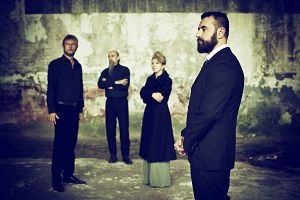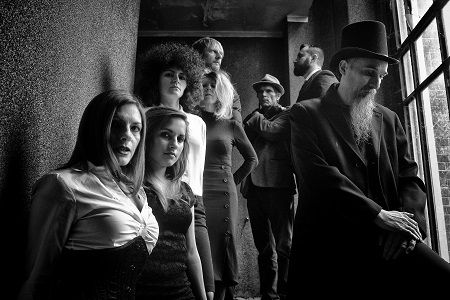
Interview by Alessandra Cognetta

Hello Alessandra, nice to meet you. Camerata Mediolanense presently are four people: me, 3vor, Marco and Manuel, aided by many other talented musicians. In fact, ours is an open ensemble, in the spirit of the ancient musical Italian “camerate”.
Camerata Mediolanense has released multiple studio albums, EPs and singles, including the latest “Vertute, Honor, Bellezza”. How would you describe the path that has been taken by the band throughout the years from 1994 to now?In few words, a musical and human brotherhood.
Listening to “Vertute, Honor, Bellezza” has been a surprising experience for me, I haven’t stumbled upon anything so unique in quite a while. I was also happy to see something I’ve studied and loved and that is part of my culture being so skilfully adapted into music. How did the album come up, what kind of results did you and the other members of the ensemble want to achieve?First it’s important to say that the new record “Vertute, Honor, Bellezza” is part of a complex enterprise that we have done completely working on Francesco Petrarca’s poetry. Petrarca is a very important Italian writer and poet of the fourteenth century, and his “Canzoniere” is the marvellous collection of poetries he has done during his life. Our work on his texts developed in not less than five years from now and, to tell the truth, it deserves various contents in addition to the full-length CD. The input to start was a relaxed situation, totally different from the colossal work developed after it! Simply, a day I had my beloved Petrarca with me near the piano and I tried to explore some lines of his poetries to dress them in music.
The results were particularly interesting, so I continued doing it, and after some time I proposed my creations to the other members of the band. We started playing together these strange songs… I say “strange” because singing in ancient Italian had an unusual effect on us, and it wasn’t easy to do, at least the first times. When we understood that it was becoming a reliable work, we started to define a complete project. The first thing was to contact Saturno Buttò, a Venetian painter followed by us for many years, to understand if he was glad to join our project. For us, he was the perfect artist to gain us in this affair. Saturno agreed with interest, so we made a detailed project for him and we started working side by side. The next agreement, with the German label Prophecy, has been the other important step because, thanks to them, we have been able to think and to organize a big enterprise.
Two songs, namely “99 Altri Perfecti” and “Vergine Bella” mark the beginning and end of an important project that focuses on Francesco Petrarca‘s poetry, which is also part of your live concerts (the next one as of now is on the 31st of August). What can you tell us about this project? Why Petrarca, how do you bring together his poetry with your music?Around “Vertute, Honor, Bellezza”, that is a twelve-tracks CD, two other records have been done. And this is not all, of course: as I said before, there is also the visual project, for all these productions, made in collaboration with Saturno Buttò. And, to end, I must hint at the written project too, done by some scholars. Starting with the music, the two records around the full-length “Vertute” are the single “99 Altri Perfecti” and the single “Vergine Bella”. They consist of six tracks in total, three of them are exclusive tracks, and three are special versions of tracks of “Vertute”.
About “99 Altri Perfecti”, it has been published by ourselves one year before “Vertute”, and it was the prologue of the enterprise: in fact, this single opens with the very first Petrarca‘s words. After it, it was the turn of the CD “Vertute”, a laborious studio work, featuring nineteen people, among which also a child, who sings the last song.
The final chapter has been “Vergine Bella”. Its three songs have been recorded and published at the end of the enterprise: in fact this single closes with the last words of Petrarca’s “Canzoniere”. For one of the songs present in this little record we have done a videoclip, the first of Camerata Mediolanense’s history, “Canzone alla Vergine”.
Then, our new label Prophecy published all the three records (“99 Altri Perfecti”, “Vertute, Honor, Bellezza” and “Vergine Bella”) into a luxury artbook of 84 pages in big size. The artbook is the best possible frame for this work because, inside it, you can find not only the music, but also the astonishing paintings and drawings made by Saturno Buttò, one for each song and one for each front-cover. You can find all Petrarca’s lyrics too, each accompanied by its translation in English made by the contemporary poet A. S. Kline. To end, you can find inside some essays to read, if you want to go in-depth: two are about Camerata Mediolanense, done by the Spanish scholar Pedro Ortega, two are about Saturno Buttò, done by Pedro Ortega again and Luis Martos, and one is about Francesco Petrarca in the history of music, done by myself.

We have dealt with Dante in the past, too, doing “Inferno”, three 7” vinyls in limited edition, all with the particular set of harpsichord, voices, effects and noises. Sometime, in the future, surely we will complete this work. The choice of Dante and Petrarca, two fathers of the Italian language, can give the impression that we deal only with poetry of the past. At the moment, this is true: poets like them speak immortal words. But we are not hostile in dealing with contemporary poetry, or with other kind of texts: we explore where we find inspiration without prejudices.
Camerata Mediolanense is an Italian ensemble, but you have mostly worked with foreign labels. This is unfortunately not uncommon in Italy, a lot of talented and innovative bands go abroad, for whatever reason it may be. How does it work in your case, what kind of “audience” do you have?Our music is attractive for people who love culture, who seek beauty, who like pondering, and who respect themselves. This kind of people are rare, but they are spread all over the world.
You have released an official video for the song “Canzone Alla Vergine” and I must say it really piqued my interest, for both the visuals and the way the scenes follow one another. Can you help us delve in a bit more deeper in the concepts behind it?The video has been wanted, planned and produced by Luminiza, our beloved singer who was in Camerata Mediolanense in “Musica Reservata” and in “Campo di Marte”. After that record, for personal reasons, she had stopped singing, for many years, even if we continued to be close friends. We have been really sad for her stop, as we loved her voice, her particular artistic expression and her human character. Recently she appreciated so much “Canzone alla Vergine” that she proposed me to be the singer of it, and to create a video. Her concept has been done in synergy with Steve Stoer’s direction. The subject of the video, and the progression of the “story”, is totally Luminiza’s interpretation following Petrarca’s words, while the technical features are Steve’s work: particularly, the speeding of the frames (operation that gives that “old-style” impression) is Steve’s idea, made possible with long motionless takes and shots. The video has been recorded in Venice and in Portugal (Sintra and Lisboa). Some frames have been done in Saturno Buttò’s atelier and it has been a very nice moment for all of us: consider, for example, that the ambiguous creature, who is the main character of the video, human/beast, woman/ram, was created by Luminiza on the basis of Saturno Buttò’s typical figures, so the scene filmed in his atelier, with the interaction between the creature and the painter, like a video-painting, has assumed a symbolic value for our whole Petrarchist experience.
You’re the mastermind of Camerata Mediolanense, Elena, but you’re also a professional composer and a musicologist. How did you get interested in music in the first place and, most importantly, how do you combine all these different activities?My aim in my youth was to become a practice musician and a theorist too. To achieve this result, on one side I took many degrees in Conservatory, becoming master in Piano, Harpsichord, Composition and others; on the other side I studied Musicology in university until the maximum level, obtaining the PhD. I published articles, edited some books, and so on. My fields of interest are in general the baroque music and the history of musical instruments (Organology), but I am also focused on very different things, like – in recent times – the analysis of contemporary pop music. Studies and writings, of course, need an enormous deal of time… For many years Camerata Mediolanense suffered for my big commitments, and this reason contributes to understand why between “Madrigali” and this new record more than ten years passed… Now, “Vertute, Honor, Bellezza” has finally arrived exactly when my academic studies are finished, and for the future my purpose is to give to our ensemble a relevant part of my time even if I will not stop doing musicological research.
We have unfortunately reached the end of the interview. Before that, though, I want to ask: what’s up next for Camerata Mediolanense?Before thinking about a new work, in this moment we relish “Vertute, Honor, Bellezza”. For the near future, we would be really glad to play many concerts to introduce it to the public, especially to those who never saw Camerata Mediolanense live. Our live dimension is important as much as the studio one, because the direct impact of our performances is strong in both directions (audience and musicians). At the moment we are playing in two different contexts. One is the context of churches, with our choral ensemble, my harpsichord and acoustic instruments, like a group of classical music, but with the great difference that we play our own music. New members of the band who joined us, are – in this context – Desiree Corapi, Giancarlo Vighi, Carmen D’Onofrio and Chiara Rolando. In these occasions many people came who had no idea about us, and the feedbacks have been particularly good; churches give a perfect reverb, that highlights our singers and moves who’s listening. The other context is our “traditional” one, I mean gigs in live clubs with amplification, keyboards, drums and so on: it is a completely different situation. In this case, the percussion set is our true protagonist, the public is mainly gothic-oriented and on stage we explore the experimental and electronic side of our sound, working on the sounds with the effects, noises, and loudness, nearby the melodic/ethereal situations.
That’s it, Elena, thank you so much for your time! If you want to leave a message to fans and readers, this is the place.We thank you very much for your interest, and we wait for you and the readers of Femme Metal at our next concerts.
Latest Multimedia